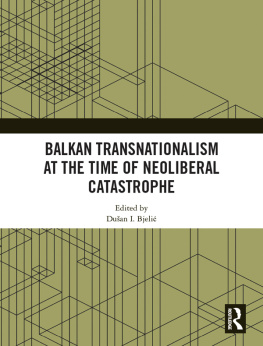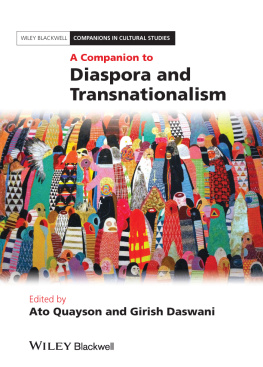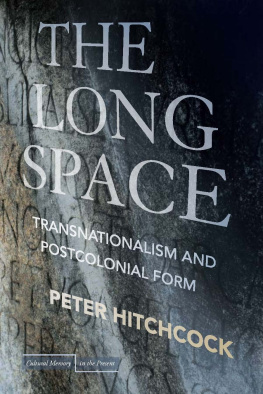A CENTURY OF TRANSNATIONALISM
STUDIES OF WORLD MIGRATIONS
Donna R. Gabaccia and Leslie Page Moch, editors
A list of books in the series appears at the end of the book.
A CENTURY OF TRANSNATIONALISM
Immigrants and
Their Homeland Connections
EDITED BY
NANCY L. GREEN
AND ROGER WALDINGER
UNIVERSITY OF ILLINOIS PRESS
Urbana, Chicago, and Springfield
2016 by the Board of Trustees
of the University of Illinois
All rights reserved
1 2 3 4 5 C P 5 4 3 2 1

This book is printed on acid-free paper.
Library of Congress Cataloging-in-Publication Data
Names: Green, Nancy L., editor. | Waldinger, Roger David, editor.
Title: A century of transnationalism : immigrants and their homeland connections / edited by Nancy L. Green and Roger Waldinger.
Description: Urbana : University of Illinois Press, 2016. | Series: Studies of world migrations | Includes bibliographical references and index.
Identifiers: LCCN 2016004958 (print) | LCCN 2016016926 (ebook) | ISBN 9780252040443 (cloth : alk. paper) | ISBN 9780252081903 (pbk. : alk. paper) | ISBN 9780252098864 (E-Book)
Subjects: LCSH : TransnationalismHistory20th century. | Emigration and immigrationSocial aspects. | ImmigrantsCultural assimilation.
Classification: LCC JV 6035 . C 46 2016 (print) | LCC JV 6035 (ebook) | DDC 305.9/06912dc23
LC record available at https://lccn.loc.gov/2016004958
CONTENTS
by Roger Waldinger and Nancy L. Green
by Caroline Douki
by Victor Pereira
by Mnica Raisa Schpun
by David FitzGerald
by Madeline Y. Hsu
by Houda Asal
by Tony Michels
by Thomas Lacroix
by Marie-Claude Blanc-Chalard
ACKNOWLEDGMENTS
This book on transnationalism in historical perspective is a truly transnational effort, prompted and supported by funders, friends, and colleagues on both sides of the Atlantic. The project was launched by a conversation with Michel Wieviorka, who pointed us in the direction of a collaborative project on immigrant cross-border activity over the longue dure and promised that the Fondation de la Maison des Sciences de lHomme (FMSH), of which he is the director, would provide support. As a historian based in Paris and a sociologist based in Los Angeles we thought that the recipe for success would lie in combining trans-Atlantic and transdisciplinary perspectives. We convened an initial such group for a conference held in Paris in May 2012, followed by a second similar event in Los Angeles in April 2013. Greatly revised versions of some of the papers presented in those two conferences appear in this book. A number of other colleagues participated in these gatherings, as either paper writers or commentators. We are especially grateful to Csar Ayala, Catherine Collomp, David Cook-Martin, Cecilia DErcole, David Gerber, Rubn Hernandez-Leon, Tobias Higbie, Rebecca Kobrin, Dan Lainer-Vos, Emmanuel Ma Mung, Ewa Morawska, Jos Moya, Constance Pris de Bollardire, Hector Perla, Paul-Andr Rosental, Guido Tintori, Andreas Wimmer, Florence Vychytil-Baudoux, Min Zhou, and Jean-Paul Zuiga, whose contributions greatly enriched our discussions. Donna Gabaccia and Leslie Page Moch, coeditors of the University of Illinois Press series Studies of World Migrations, early saw merit in this project; their confidence and that of the Presss editors provided much needed support from early stages right through the end.
We are also grateful to the colleagues who assisted with the practical aspects of this project, as well as the funders who made it possible. At the FMSH, Jean-Pierre Dozon provided guidance and helped mobilize resources. Dana Diminescu, the director of the FMSH program on Migration and Information Technology and Communication, also provided the opportunity and resources for an invaluable collaboration. She suggested organizing a joint event on Homeland Connections, which resulted in stimulating parallel sessions on the E-Diaspora Atlas that she coordinated and presented to the public at this conference, and our own sessions on A Century of Transnationalism. Thanks also to Luc Gruson, Marianne Amar, and the Cit Nationale de lHistoire de lImmigration, Paris, which hosted our May 2012 conference. In addition, invaluable material support was provided during 20122013 by the FMSH and the Consulat gnral de France Los Angeles as well as a variety of entities at our own institutions: at the cole des Hautes tudes en Sciences Sociales, the Centre de Recherches Historiques, and the Division of Research Development; and at the University of California, Los Angeles, the International Institute, the UCLA Program on International Migration, the Burkle Center for International Relations, the Center for European and Eurasian Studies, the Centre Pluridisciplinaire, and the Department of History.
Last, we thank one another!for the many years of enjoyable and stimulating conversation leading up to this volume and for the collegiality and friendship that made this particular endeavor a pleasure from beginning to end.
A CENTURY OF TRANSNATIONALISM
I NTRODUCTION
Roger Waldinger and Nancy L. Green
Immigrants were once known as uprooted. Later, they became seen as transplanted, reflecting a new scholarly appreciation of the ways in which social networks facilitated migration. Today, the discovery of transnationalism has transformed migration studies again. Ubiquitously invoked to describe mobility present and past, the term has been used to show how international migration generates ideas, goods, and civil and political engagements spilling across national boundaries.
Though immensely influential, the transnational perspective has also generated great controversy, with questions related to change consistently yielding dispute. Initially, scholars asserted that the home country connections of contemporary international migrants were unprecedented, with many contending that transnationalism was a late-twentieth-century phenomenon fueled by new modes of communication and transportation. Historians instantly countered: the last age of mass migration entailed a similar transoceanic ebb and flow of people, goods, and ideas; likewise, many nationalist movements were born in exile, which is why a contemporary immigrant preoccupation with homeland politics represents nothing new. While that response elicited general agreement, debate over the novelty of transnationalism continued, without, however, fully meeting the challenge of thinking through long-term patterns. In many assessments of the historical record, the starting point entails an opposition between now and then, yet that contrast takes for granted what needs to be explained: we need to know when and why now began and then endedcrucial questions that have not seriously been posed. Moreover, the many migration experiences seem too great to fit into any one scheme: period boundaries are likely to take a variety of forms, depending on the precise connection between place of origin and place of destination. How then to describe and analyze change over time?
The nature of the core claims and the underlying theoretical framework have also triggered debate. To some extent, the very term transnational is unfortunate: it collapses state and nation, one referring to a political unit, the other to a social collectivity. The crossing of state boundaries fundamentally differentiates international from internal migrations: in the latter, migrants change places within a state; in the former, the migrants go between states. Moreover, while migrants cross-state connections sometimes extend beyond the nation (as implied by the Latin prefix trans ), they usually do not. Instead, those ties often tend to take highly particularistic form, linking up a particular category of people here to some specific set of people there. The home to which the migrants prove attached is as likelyif not more soto involve the village, region, or even ethnic minority of origin, as opposed to the sending state or the imagined nation to whom that state is presumed to belong. And for that reason, local memories of the place left behind may be more salient to the migrant than patriotic or sentimental attachments to the abstract entity of the nation never personally experienced.


 This book is printed on acid-free paper.
This book is printed on acid-free paper.




